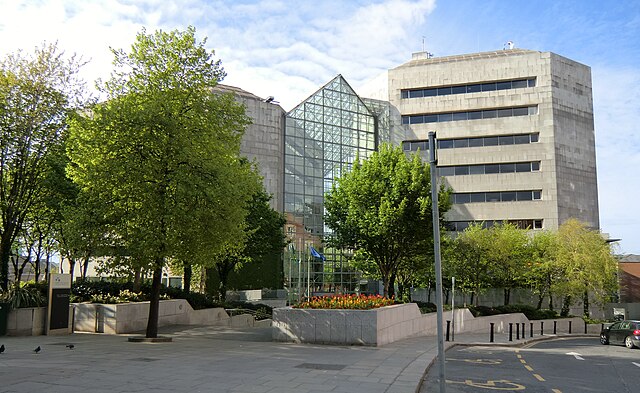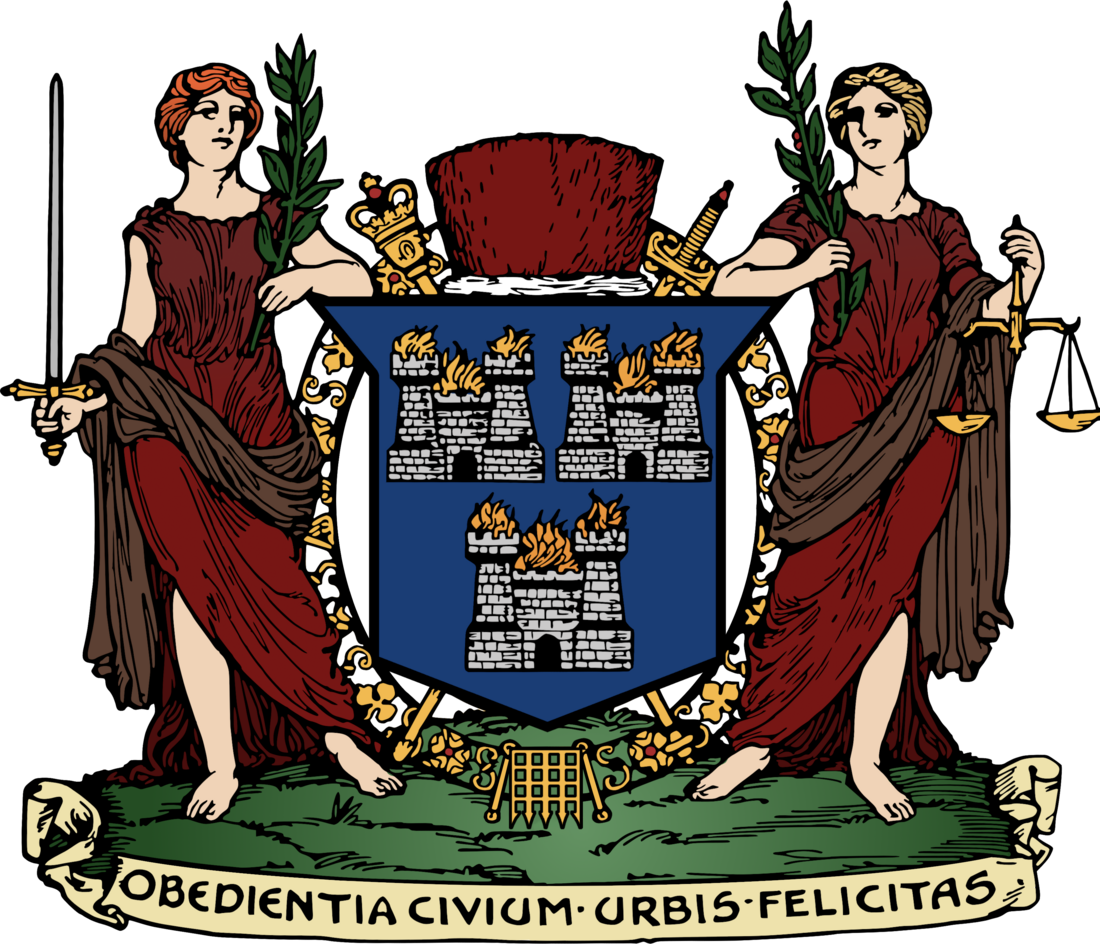Top Qs
Timeline
Chat
Perspective
Dublin City Council
Local authority for Dublin city in Ireland From Wikipedia, the free encyclopedia
Remove ads
Dublin City Council (Irish: Comhairle Cathrach Bhaile Átha Cliath) is the local authority of the city of Dublin in Ireland. As a city council, it is governed by the Local Government Act 2001. Until 2001, the authority was known as Dublin Corporation. The council is responsible for public housing and community, roads and transportation, urban planning and development, amenity and culture and environment. The council has 63 elected members and is the largest local council in Ireland. Elections are held every five years and are by single transferable vote. The head of the council has the honorific title of Lord Mayor. The city administration is headed by a chief executive, Richard Shakespeare. The council meets at City Hall, Dublin.
Remove ads
Legal status
Summarize
Perspective
Local government in Dublin is regulated by the Local Government Act 2001. This provided for the renaming of the old Dublin Corporation to its present title of Dublin City Council. Dublin City Council sends seven representatives to the Eastern and Midland Regional Assembly, one of three such Assemblies in the state.[3]
Dublin City is bordered by the counties of Fingal, South Dublin and Dún Laoghaire–Rathdown. These four local government areas comprise the traditional County Dublin. In 2013, all of Dublin's councils, except Fingal, supported the introduction of an executive mayor the Dublin Metropolitan Area, and a Citizen's Assembly has been planned in order to establish what a combined Dublin Mayorship would look like.[citation needed]
Statutory functions
The functions of the City Council include: public housing, city library services, refuse services, drainage, driver and vehicle licensing, planning and roads. The Dublin City Council's Draft Budget for 2023 estimates a total revenue of €1.24 bn, which is an increase of €0.11bn from the previous year. The Housing and Building Division is the service with the largest spend, with an estimated operational expenditure of €550.5 m, almost €53 m more than in 2022. The estimated income for Housing and Building in 2023 is €457.5 m, up from €420.6m in 2022. The draft budget aims to maintain existing service levels at 2022 levels, with some modest increases in a small number of areas.
Remove ads
Budget
Summarize
Perspective
2023 (draft)
The estimated expenditure for 2023 is €1.24 bn, which is an increase of €0.11 bn over the 2022 Budget of €1.130 bn.[4] The expenditure is divided into several service divisions, including Housing & Building, Road Transport & Safety, Water Services, Development Management, Environmental Services, Culture, Recreation & Amenity, and Agriculture, Education, Health & Welfare. The Housing and Building Division remains the service with the largest spend, with an estimated operational expenditure of €550.5m in 2023, almost €53m more than in 2022 (€497.4m). This increase relates to services that are largely government-funded, such as homeless services and RAS.
The estimated expenditure for each service division is:
- Housing and Building: €550,484,483
- Water Services: €68,093,780
- Development Management: €63,715,641
- Environmental Services: €247,419,867
- Culture, Recreation and Amenity: €122,254,773
- Agriculture, Education, Health and Welfare: €2,746,874
Compared to the 2022 budget, the estimated expenditure for 2023 increased by €0.11 bn. This increase is largely due to the increased spending on Housing and Building services, which are largely Government funded. The estimated net expenditure for each service division in the Dublin City Council's Draft Budget for 2023 is listed above
The 2022 budget allocated €15.4 mn for energy-related expenses for Dublin City Council (DCC). DCC faces an additional €22.5 mn in costs over 2022 and 2023 due to energy and non-energy inflation. The government provides €5 mn for rising energy costs, and DCC bears the impact of broader inflation. Additionally, a public sector pay deal includes €9.9 mn and €25.9 mn in 2022 and 2023, respectively, to support the City Council as an employer.
Remove ads
History

Prior to 1841, the administrative and governmental system of Dublin, known as Dublin Corporation, was bicameral having an assembly of called the "House of Aldermen" and another called the "House of Sheriffs and Commons". Under the Municipal Corporations (Ireland) Act 1840, they were replaced by a unicameral assembly. The name Dublin City Council was adopted for the unicameral assembly. The Lord Mayor of Dublin presided over the assembly. This office had existed since 1665. The first City Council was elected in October 1841 when Daniel O'Connell became the first Lord Mayor. Since 1 January 2002, the functions of local government have been transferred to Dublin City Council.[5] To coincide with its name change, the city council adopted a new logo and brand identity, based on a simplified version of the ancient "three castles" symbol.

Structures
Executive power is shared between the council and an appointed executive official known as the chief executive. The chief executive is responsible for a staff of 6,200. The offices of the chief executive and other administrative staff are based in the Civic Offices on Wood Quay. The Lord Mayor of Dublin acts as chair of the council is the ceremonial head of the city government.
Representative power is vested in the city assembly which has 63 members. The City Council meets in plenary session on the first Monday of every month in Dublin City Hall. One of the council's most important roles is that of passing an annual budget. Should any Irish council fail to pass a budget within the allotted time, the Minister for the Environment is empowered to abolish it and grant its powers to a commissioner until the next scheduled council elections.
Remove ads
Elections
Summarize
Perspective
Members of Dublin City Council are elected for a five-year term of office on the electoral system of proportional representation by means of the single transferable vote from multi-member local electoral areas.
|
|
Total seats | ||||||||||||||||||
| 1985 |
|
52 | |||||||||||||||||
| 1991 |
|
52 | |||||||||||||||||
| 1999 |
|
52 | |||||||||||||||||
| 2004 |
|
52 | |||||||||||||||||
| 2009 |
|
52 | |||||||||||||||||
| 2014 |
|
63 | |||||||||||||||||
| 2019 |
|
63 | |||||||||||||||||
| 2024 |
|
63 | |||||||||||||||||
Remove ads
Local electoral areas
Summarize
Perspective
Dublin City is divided into LEAs, defined by electoral divisions.[6] The electoral divisions were formerly known as wards and were defined in 1986, subject to revision in 1994 and in 1997.[7]
Remove ads
Current councillors
Summarize
Perspective

Official residence of the Lord Mayor of Dublin.
2024 seats summary
Councillors by electoral area
This list reflects the order in which councillors were elected on 7 June 2024.[8]
Co-options
Changes in affiliation
- Notes
Remove ads
Council buildings

Executive and administrative offices.
The Lord Mayor's official residence is the Mansion House, which first became the residence of the Lord Mayor in 1715.
Council meetings take place in the headquarters at Dublin City Hall. Formerly Royal Exchange, the City Hall is one of Dublin's finest buildings and located on Dame Street. It was built in 1769–79 to the winning design of Thomas Cooley. In an architectural competition, James Gandon was the runner-up with a scheme that many people favoured. The building was taken over for city government use in the 1850s.
Remove ads
References
External links
Wikiwand - on
Seamless Wikipedia browsing. On steroids.
Remove ads




